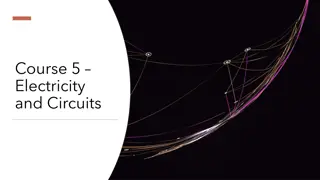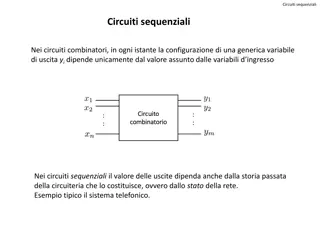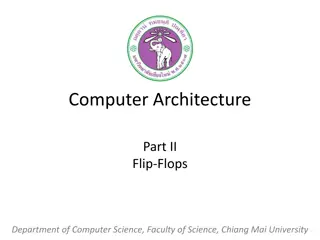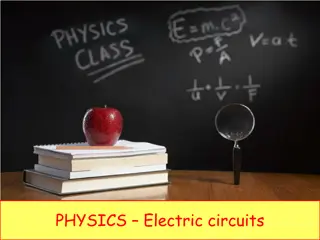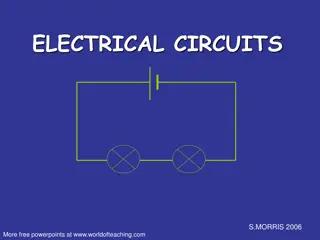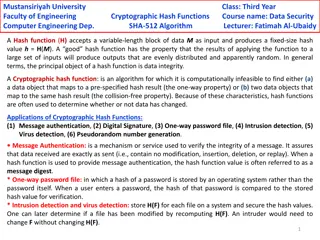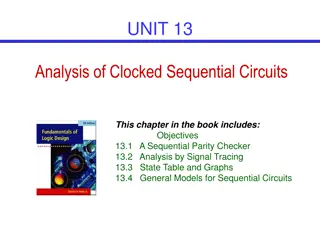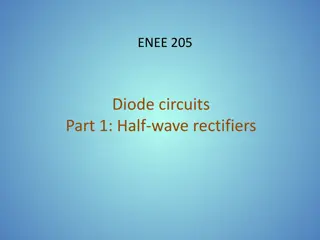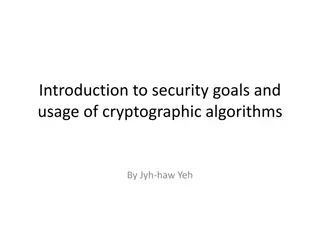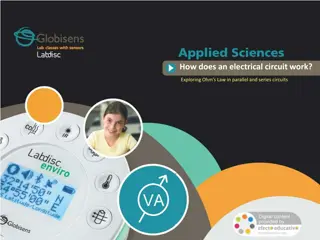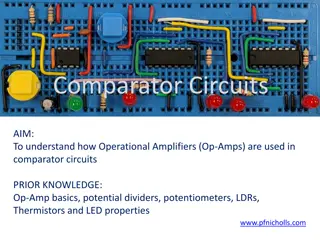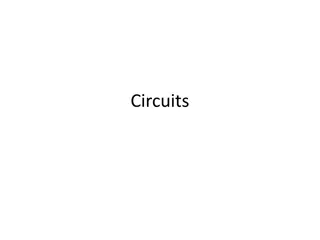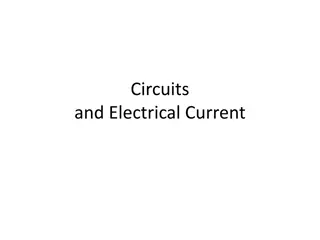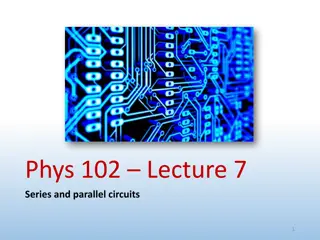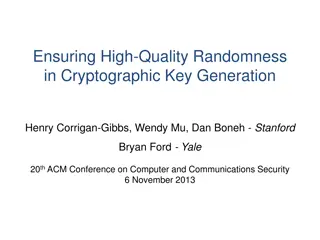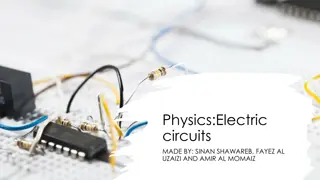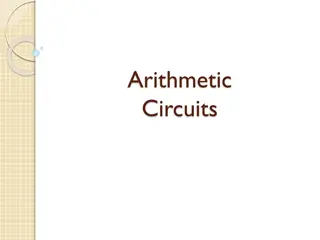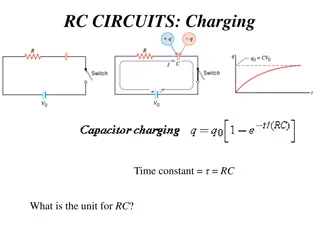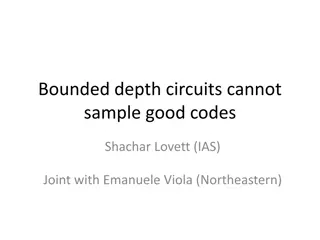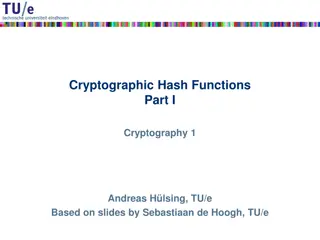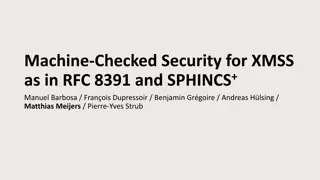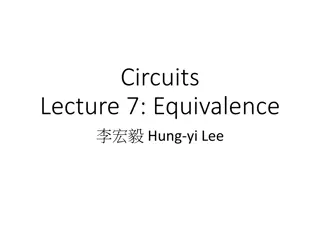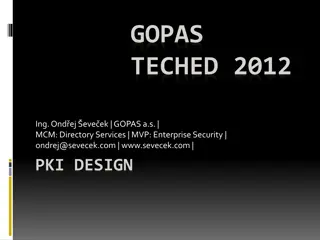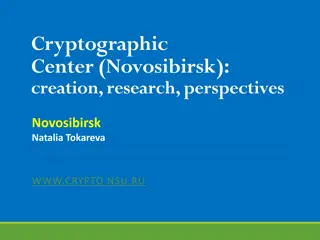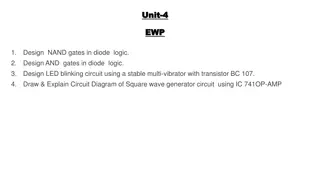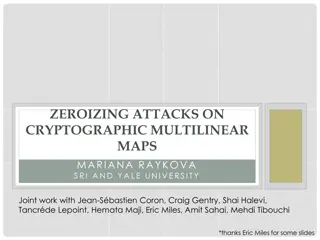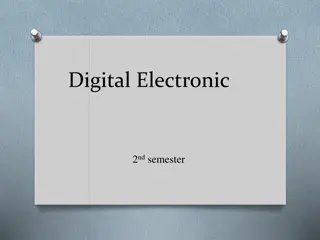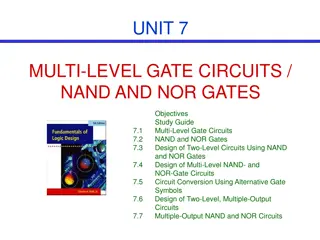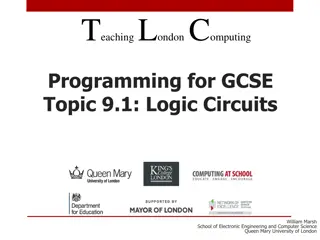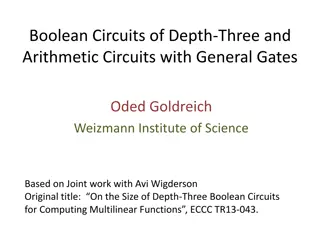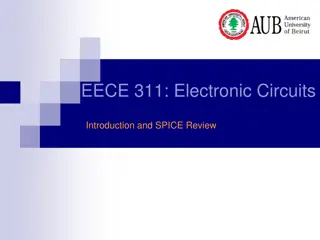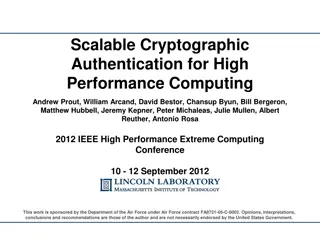Cryptographic Reductions and Learning in Computational Complexity
This lecture explores the connection between computational complexity and cryptography, focusing on topics like pseudorandom functions, public-key cryptography, and learning from Gaussians. It delves into the implications of cryptographic reductions, lower bounds for learning MLPs, and the existence
0 views • 22 slides
Understanding Electricity and Circuits: Basics, Components, and Applications
This educational course covers topics such as circuit symbols, calculating and measuring electrical quantities, identifying circuits, and understanding the relevance of electricity in engineering. It explains essential circuit components like energy sources, conductors, insulators, loads, control de
12 views • 30 slides
Understanding Sequential Circuits: A Brief Overview
Sequential circuits differ from combinational circuits in that the output depends not just on the current input but also on the circuit's past history. This overview covers the basics of sequential circuits, including finite-state automata, states, transitions, and memory elements like flip-flops.
2 views • 50 slides
Understanding Sequential Logic Circuits in Digital Systems
Logic circuits in digital systems can be either combinational or sequential. Sequential circuits utilize storage elements along with logic gates, where outputs depend not only on present inputs but also on past inputs and internal states. They are essential building blocks, with storage registers pl
5 views • 20 slides
Understanding Combinational Circuits in Computer Architecture
Combinational circuits in computer architecture play a crucial role in transforming binary information from input data to output data. These circuits consist of logic gates connected in a specific arrangement to process binary data efficiently. Key components such as half-adders and full-adders are
1 views • 48 slides
Understanding Cryptographic Data Integrity Algorithms
Cryptographic data integrity algorithms ensure data integrity, verifying data received matches what was sent by authorized entities. Cryptographic hash functions play a crucial role in ensuring data integrity through hash values. Applications include message authentication, digital signatures, and v
3 views • 41 slides
Comprehensive Guide to Electric Circuits and Circuit Diagram Interpretation
Explore the fundamentals of electric circuits, circuit components, and diagram interpretation. Learn about series and parallel circuits, resistors, sources, switches, transducers, and more. Discover how to calculate resistance, current, and potential difference in circuits. Gain insights into diodes
2 views • 76 slides
Understanding Electrical Circuits: Basics and Types
The presentation covers the basics of electrical circuits, explaining the concept of electric current, the role of cells and batteries, simple circuit components like switches and lamps, and circuit diagrams. It further delves into types of circuits - series circuits and parallel circuits, detailing
0 views • 24 slides
Cryptographic Hash Functions in Data Security: Mustansiriyah University Course Overview
Cryptographic hash functions play a crucial role in ensuring data integrity and security. This course at Mustansiriyah University's Faculty of Engineering covers the SHA-512 algorithm and its applications in various fields such as message authentication, digital signatures, and intrusion detection.
0 views • 6 slides
Analysis of Clocked Sequential Circuits and Parity Checkers
This chapter delves into the analysis of clocked sequential circuits, focusing on topics such as sequential parity checkers, signal tracing, state tables and graphs, and models for sequential circuits. It covers concepts like Mealy and Moore machines, state equations, state graphs, timing charts, an
0 views • 38 slides
Understanding Diode Circuits: Half-Wave Rectifiers and Full-Wave Rectifiers
Diode circuits play a crucial role in converting AC signals to DC signals. This article covers the basics of diodes, half-wave rectifiers, and full-wave rectifiers. It explains the functioning of unfiltered and filtered rectifier circuits, highlighting the differences in ripple effects and voltage r
6 views • 18 slides
Understanding Security Goals and Cryptographic Algorithms
Introduction to security goals such as privacy, data integrity, authentication, authorization, and availability, along with the usage of cryptographic algorithms like symmetric and asymmetric key algorithms, keyed hashing, and digital signatures for achieving different security objectives in communi
0 views • 13 slides
Understanding Electrical Circuits and Ohm's Law
Electric circuits play a crucial role in our daily lives, powering various devices and appliances. This activity delves into Ohm's Law in parallel and series circuits, exploring the flow of electric current and the transformation of electrical energy into different forms. Through hands-on experiment
0 views • 31 slides
Understanding Operational Amplifier (Op-Amp) Comparator Circuits
Operational Amplifiers (Op-Amps) are commonly used in comparator circuits to convert analog inputs to digital outputs. In comparator circuits, the Non-Inverting input being higher or lower than the Inverting input determines whether the output is ON or OFF. Real comparators like the 741 or 081 have
1 views • 14 slides
Understanding Circuits: Exploring Requirements, Function, and Analogies
Delve into the world of circuits by learning about their requirements, functions, and different types. Discover how circuits work, their components like bulbs and batteries, and explore analogies like comparing circuits to water parks. Gain insights into the flow of electrons and the essential laws
0 views • 47 slides
Exploring Electric Circuits in Grade 6 Natural Sciences and Technology
Dive into the world of electric circuits with Grade 6 students as they learn about circuit diagrams, different configurations involving cells, bulbs, and switches. The images provide visual examples of circuits with varying components, encouraging students to identify differences and understand how
0 views • 8 slides
Exploring Circuits and Electrical Current: Essential Concepts and Experiments
Dive into the world of circuits and electrical current with a focus on understanding the requirements, components, and functioning of circuits. Explore essential questions, experiment with building circuits, and grasp the basics of how electricity flows through a circuit. Discover the different type
0 views • 54 slides
Electric Circuits: Series and Parallel Configurations Explained
In this lecture on electric circuits, we delve into series and parallel circuits featuring batteries, wires, resistors, and capacitors. Key concepts discussed include Kirchhoff's loop rule, series components, and equivalent resistance and capacitance. Learn how to simplify complex circuits and analy
0 views • 24 slides
Enhancing Cryptographic Key Generation with High-Quality Randomness
This presentation discusses the critical aspect of ensuring high-quality randomness in cryptographic key generation processes. It explores key vulnerabilities and common failure modes, emphasizing the importance of incorporating strong randomness. The content delves into various methods and issues r
0 views • 45 slides
Understanding Electric Circuits: Basics and Examples
An exploration of electric circuits, including their components, symbols, and the flow of current. Learn about examples of electric circuits used in devices like televisions and loudspeakers. Test your knowledge with questions on circuit symbols, the definition of an electric circuit, and examples o
0 views • 11 slides
Understanding Combinational Circuits in Digital Electronics
Combinational circuits are an essential component of digital electronics, combining different gates to perform specific functions without memory usage. They provide outputs based solely on present input levels, with no influence from previous states. Types of combinational circuits include half adde
0 views • 55 slides
Applications of RC Circuits in Electronics and Biomedical Devices
RC circuits play a crucial role in various applications such as camera flashes, timing devices in automobiles, and heart pacemakers. These circuits involve charging and discharging a capacitor through a resistor, controlling voltage pulses for precise timing. In devices like camera flashes, the flas
0 views • 7 slides
Lower Bounds on Sampling Good Codes in Bounded-Depth Circuits
Bounded-depth circuits are proven unable to sample or approximate good codes effectively. This work delves into lower bounds, showcasing that bounded families of circuits face limitations in computing specific functions or sampling distributions. The example of Parity in AC0 circuits illustrates the
0 views • 21 slides
Understanding Cryptographic Hash Functions
Cryptographic hash functions play a crucial role in various aspects of security, including integrity protection, checksum generation, password hashing, digital signatures, and more. They are designed to efficiently convert input data of arbitrary length into fixed-length output, aiding in tasks like
0 views • 32 slides
Understanding Integrated Circuits: Fabrication and Packaging Technology
Integrated circuits are fabricated on silicon wafers using a photographic process. The resolution of this process determines the number of devices that can be integrated onto a single chip. After fabrication, the wafer is tested, diced, and functional die are packaged using aluminum or gold wires. T
0 views • 11 slides
Enhancing Security for XMSS and SPHINCS+ Using Machine-Checked Methods
Advanced cryptographic techniques such as XMSS and SPHINCS+ are critical for ensuring secure digital signatures in a post-quantum world. This project focuses on improving the security and verification processes of XMSS and SPHINCS+ using machine-checked methods, aiming to enhance trust in these cruc
1 views • 17 slides
Understanding Equivalent Networks in Circuits
Explore the concept of equivalent networks in circuits, detailing how they simplify complex circuits, along with comparisons to programming functions. Delve into the parallels between circuit design and programming, highlighting the importance of structuring circuits like functions. Discover the ben
0 views • 50 slides
Cryptographic Algorithms and Hash Collisions Overview
Explore the world of cryptographic algorithms and hash collisions. Learn about various hashing algorithms like MD5, SHA-1, SHA-256, and more. Dive into the concepts of symmetric and asymmetric key algorithms and understand the risks associated with hash collisions. Discover the implications of post-
0 views • 58 slides
Franco-Japanese Cybersecurity Workshop Highlights and Future Plans
The 5th Franco-Japanese Cybersecurity Workshop concluded with insightful discussions on key areas such as IoT security, AI, hardware security, and supply chain security. The steering committee members shared plans for the 6th workshop in France, emphasizing policy discussions and cross-cutting issue
0 views • 18 slides
Understanding Electric Circuits in Grade 6 Science
Explore the world of electric circuits in Grade 6 Natural Sciences and Technology. Learn about components like cells, conductors, light bulbs, and switches. Discover how symbols represent these elements and see examples of circuits with different configurations. Get familiar with crocodile clips for
0 views • 9 slides
Cryptographic Center in Novosibirsk: Advancements in Cryptography and Research
The Cryptographic Center in Novosibirsk, established in 2011, focuses on advancing cryptography through research, education, and international collaborations. With a team of researchers and students, the center explores various aspects of cryptography, including cryptographic Boolean functions, ciph
0 views • 33 slides
Exploring Diode and Transistor Logic Circuits for LED Blinking and Logic Operations
Dive into the world of diode and transistor logic circuits with designs for NAND and AND gates, as well as LED blinking circuits using stable multi-vibrators. Learn how these circuits function and discover the components involved in creating a square wave generator. Explore the practical application
0 views • 9 slides
Zeroizing Attacks on Cryptographic Multilinear Maps: Overview and Applications
Cryptographic multilinear maps (MMAPs) enable computations on encoded secret data, offering similarities to fully homomorphic encryption (FHE) while providing distinct features. MMAPs find applications in identity-based encryption, non-interactive zero-knowledge proofs, and more. The evolution of MM
0 views • 45 slides
Introduction to Digital Electronic Circuits and Logic Gates
Understanding digital electronic circuits and logic gates is essential for building digital systems. This content covers the basics of logic gates, digital signals, and the practical application of binary digits in circuits. It discusses the function and importance of logic gates, such as NOT gates
0 views • 17 slides
Design of Multi-Level Gate Circuits Using NAND and NOR Gates
Explore the design and analysis of multi-level gate circuits using NAND and NOR gates, including two-level and multiple-output circuit design. Learn about circuit conversion, alternative gate symbols, AND-OR, OR-AND configurations, and factorization of multi-level gate circuits. Dive into examples a
0 views • 28 slides
Understanding Logic Circuits in Computer Architecture
Explore the world of logic circuits through this comprehensive guide. Learn about logic gates, truth tables, and how computers are built from these components. Discover the basics of logic gates like AND, OR, and NOT, and delve into connecting gates to create functional circuits. Enhance your unders
0 views • 20 slides
Understanding Cryptographic Protocols and Key Exchange
This content delves into the world of cryptographic protocols, discussing the importance of security measures such as symmetric cryptography, hash functions, and public-key cryptography. It explores the field's various studies, goals, Diffie-Hellman key exchange, and the significance of key size in
0 views • 28 slides
Depth-Three Boolean Circuits and Arithmetic Circuits: A Study on Circuit Complexity
Explore the intricacies of depth-three Boolean circuits and arithmetic circuits with general gates, focusing on the size, structure, and complexity measures. The research delves into the relationship between circuit depth, gate types, and multi-linear functions, offering insights into circuit models
0 views • 12 slides
Electronic Circuits Introduction and SPICE Review Course Information
This course, EECE 311, provides an in-depth exploration of electronic circuits, covering topics such as BJT and MOSFET amplifiers, feedback systems, operational amplifiers, oscillators, and digital CMOS circuits. Students will gain knowledge on amplifier characteristics, frequency response, and the
0 views • 8 slides
Scalable Cryptographic Authentication for High Performance Computing
This work discusses the scalable cryptographic authentication approach developed by Andrew Prout and team for high-performance computing. The LLGrid system architecture, challenges with interactive supercomputing, and utilization of LLGrid for various computing tasks are explored, highlighting the i
0 views • 34 slides

